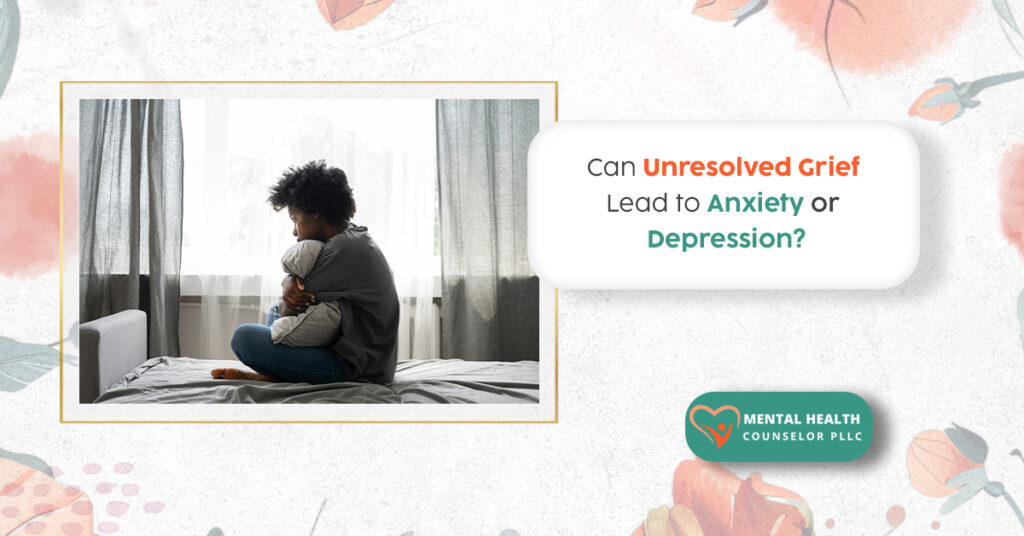
Losing someone or something you love hurts. That hurt is normal. At times, the pain can persist for a long while. When grief stays and does not ease, it can lead to other problems. Two common problems are anxiety and depression.
What Is Grief?
Grief is a strong feeling after a loss. You may feel sad, angry, confused, or guilty. These feelings are normal. People often move through steps like Denial, Anger, Bargaining, Depression, Testing, and Acceptance. You might skip steps. That is okay.
Grief can make small jobs hard. Getting dressed, eating, or sleeping may feel heavy. Grief is part of life, but it does not have to take over everything.
What Is Unresolved Grief?
Unresolved grief means the pain stays for a long time. You may feel stuck. You might find it hard to talk about the loss. You might keep thinking about what you could have done differently. These things can keep sadness alive.
When grief stays, it can change how you think and feel each day. That can lead to anxiety or depression.
How Unresolved Grief Can Lead To Anxiety
Anxiety can feel like worry that will not stop. Unresolved grief can cause this worry in a few ways:
- Worry About the Future. You may fear that more bad things will happen. You fear who will care for you, and it’s getting worse.
- Trouble Sleeping. Nighttime can bring scary thoughts. Not sleeping well can make worry worse.
- Being On Edge. You may jump at small things. You might watch for danger all the time. This constant alertness is a sign of anxiety.
- Avoiding Places. To skip pain, you may avoid people or places that remind you of the loss. This makes life smaller and fear bigger.
How Unresolved Grief Can Lead To Depression
Depression is more than being sad. It can make life feel empty or hard to care about. Unresolved grief can turn into depression this way:
- Long Lasting Sadness. If sadness does not ease, it can deepen into depression.
- Losing Interest. Things you liked before may not feel fun anymore.
- Guilt. You may blame yourself for the loss. Guilt can weigh you down.
- Low Energy. Grief can make you tired all the time. This tiredness can become a long, low mood.
Signs to Watch For
You don’t need to possess all of these signs. If many last for weeks, get support.
Signs of anxiety after grief:
- Worry that will not stop.
- Trouble sleeping most nights.
- Feeling tense or on edge.
- Avoiding friends or places.
Signs of depression after grief:
- Feeling empty or hopeless.
- Not enjoying things you once liked.
- Sleeping or eating a lot more or less.
- Very low energy.
- Thinking life is not worth living.
If you think about hurting yourself, tell someone right away. Call emergency services or a crisis line. You don’t have to confront that by yourself.
How Mental Health Counselor, PLLC Can Support You
At Mental Health Counselor, PLLC, we use methods that are tested by research. Our work focuses on your unique grief. We guide you to reframe painful thoughts. We teach ways to cope when feelings feel too big. We assist you in taking small steps to feel steadier.
What we focus on:
- Understanding your own grieving process.
- Building coping skills for strong feelings.
- Reclaiming little pleasures and motivations to rise each morning.
- Letting go of guilt and heavy thoughts.
Our licensed psychotherapist offers care in person and online. You can meet at the office or via secure video call. Therapy is made simple and safe. We move at your pace.
Simple Steps You Can Try Today
These small steps can make some days easier.
- Keep a Routine. Try to wake and sleep at the same time. Eat meals at regular times.
- Move a Little. Short walks or tiny stretches can lift your mood.
- Name Your Feelings. Say or write the feeling. Naming it can make it feel less scary.
- Talk With Someone. Tell a friend that you’re struggling today. You do not need to say everything.
- Do One Small Thing. Make one tiny goal each day and finish it.
- Hold A Memory. Keep a photo or a note that remembers good times.
What to Expect From Therapy
Therapy is a safe place to be heard. A therapist will listen without judging. Together, you will look at what keeps you stuck. You will learn tools to calm anxiety and lift low moods. You will work at a pace that feels most comfortable for you. Over time, life can feel steadier and kinder.
When to Reach Out
Consider seeing a therapist if:
- Your pain lasts for many weeks.
- You feel anxious most days.
- You cannot do simple tasks.
- You have thoughts about ending your life.
If these fit your life, reach out for support. Timely assistance can change the direction of grief.
You Do Not Have To Be Alone
Grief can feel heavy and lonely. You do not need to carry it alone. Mental Health Counselor PLLC is available to offer support, guidance, and a listening ear. We offer kind care to assist you in finding balance again. You can meet in person or online. We will align with your requirements and move at your pace.
We’re here and ready to support and listen to you when you are ready. You should receive gentle and patient care. Grief is part of your journey. It shouldn’t be a hurdle to hold onto.
FAQs
Q. Is it okay to avoid reminders at first?
Yes. But if avoiding keeps you from living, a psychotherapist can guide you to face things slowly.
Q. Do online sessions work?
Yes. Virtual meetings with a licensed psychotherapist are just as effective as in-person sessions.
